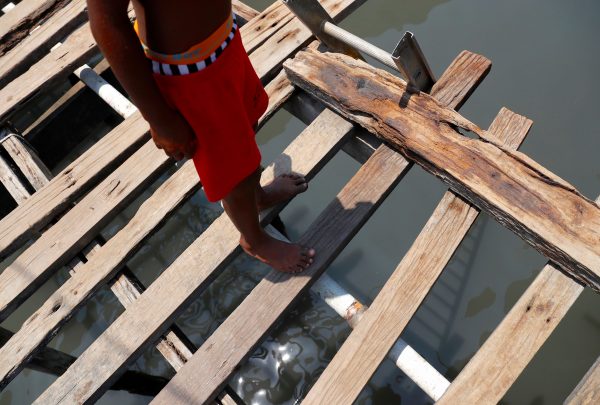He had consolidated his position by late 2019 by attracting leading members of the opposition into government, and membership was growing in the Pangu Pati of which he had become parliamentary leader. But a myriad of political, health and economic challenges would soon threaten his leadership.
The onset of the pandemic was seen as a serious threat. Funding shortages and poor governance undermined the capacity of the health sector to deliver critical services. But PNG weathered the pandemic well, having recorded only 760 cases and 8 deaths as of 19 December. The government was assisted by aid from Australia and China, and by US$364 million in emergency funding from the IMF to address balance of payments issues.
The government’s attempts to gain more favourable terms from major foreign investments in the mining and petroleum sectors were less successful. In January 2020, the government’s State Negotiating Team pulled out of discussions with ExxonMobil over the development of the P’nyang gas field, citing the company’s ‘unwillingness to agree to reasonable terms’ — though in September Marape said he was confident that the project would go ahead.
In August, the government rejected Barrick (Niugini) Ltd’s (BNL) application for an extension of the special mining lease it held for the Porgera Joint Venture — one of the world’s largest gold mines. The lease was awarded to state enterprise Kumul Minerals Holdings Ltd. Two months later, it was announced that PNG would take a major equity in the project while BNL would continue to operate the mine, with a fair share of economic benefits.
The Wafi-Golpu Joint Venture has also been held up by disputes over the company’s proposed waste disposal arrangements. In the East and West Sepik provinces, provincial governments are opposing the proposed Frieda River gold and copper mining project over concerns about possible impact on the Sepik River.
There has been plenty of popular support for Marape’s efforts to gain better returns for the government and landowners from major resource projects, but in a period of financial stringency, Marape has also been criticised over the revenue forgone in these ventures.
Still, it came as a surprise when on 13 November opposition parliamentarians declared their intention to move a vote of no confidence against Marape. Over 40 members of the government — including Deputy Prime Minister Sam Basil and 12 cabinet ministers — crossed the floor. They succeeded in replacing the members of the Permanent Parliamentary Committee on Private Business, which vets prospective votes of no confidence, and carried a motion 57 votes to 39 to adjourn the house until 1 December, when Marape’s constitutional grace period expires.
While the move against Marape seems to be partly opportunistic on the part of some aspiring leaders, notably Basil but also displaced former prime minister Peter O’Neill, the government’s failure to deliver on resource issues appears to be a significant factor. On 16 November, four Engan parliamentarians, led by former speaker Sir John Pundari and former foreign minister Rimbink Pato, issued a statement condemning ‘foolish acts by the Marape government [which] have seen the [Porgera] mine to remain [sic] closed’. Resentment towards Marape may also have been fuelled by his insistence that O’Neill and the remnants of his People’s National Congress party move to the opposition benches.
While opposition leader Belden Namah was setting up camp in Vanimo, West Sepik, and attempting to assemble a winning coalition, Speaker Job Pomat recalled Parliament, overruling the decision of his deputy to allow the adjournment on 13 November. Marape and 49 of his supporters resumed sitting on 17 November, passing the 2021 budget, reversing the changes in the Committee on Private Business, and adjourning Parliament until 20 April 2021. O’Neill requested a Supreme Court determination on the legality of the sitting and the passage of the budget.
Meanwhile, several parliamentarians, including United Resources Party leader William Duma, were reported to have shifted back to the government, and Marape expressed confidence in his ability to regain majority.
But on 8 December the Supreme Court handed down its decision on O’Neill’s challenge, ruling that Pomat did not have authority to override the deputy speaker’s decision and recall Parliament, and that all parliamentary business conducted on 17 November was null and void. It ordered that Parliament be recalled on 14 December.
Parliament fell into further disorder over the eligibility of the member for Kerowagi, Bari Palma. With government and opposition numbers apparently even, Palma’s status was considered critical to the outcome of a vote of no confidence. Speaker Pomat adjourned the house for two days and the opposition filed a vote of no confidence, naming National Alliance Party leader Patrick Pruaitch alternate prime minister.
When Parliament reconvened on 16 December, however, 18 parliamentarians, led by Pundari and including Basil, crossed back from opposition to government, giving Marape a clear majority. Parliament then passed the budget and adjourned until 20 April 2021, putting off any possible vote of no confidence.
Given the volatility of Papua New Guinea politics, Marape could still face a vote of no confidence when parliament resumes in April 2021, but at the close of 2020, as at the beginning of it, he appears to be in a strong position as coalition leader. The major problems facing his government in 2020, however, remain.
Ronald May is Emeritus Fellow at the Department of Pacific Affairs, The Australian National University.
This article is part of an EAF special feature series on 2020 in review and the year ahead.


Comment on Freda Mine Project and when will it commence operations: People are waiting to see the copper and gold processing since many people are dying. The citizens of Freda Mine Project area of Telefomin,Vanimo and Nuku West Sepik Province are concerned.